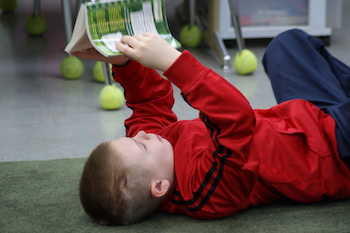Enlisting Reading Mentors
Join Our Community
Access this resource now. Get up to three resources every month for free.
Choose from thousands of articles, lessons, guides, videos, and printables.
Wendy Vander Linden
Finding “good-fit” reading material can be difficult for students who read significantly beyond grade level, and it’s sometimes difficult to guide them to the right materials. As teachers, we know it isn’t appropriate to hand fourth-grade students Of Mice and Men, even if they could read and understand every word. When my son struggled to find engaging and appropriate texts, I decided to find a reading mentor who could help him navigate his literary needs. Using a reading mentor can be a great way to help gifted readers find texts that have appropriate content and meet their need for challenging materials.
Why does having a reading mentor make sense? As teachers, we know the power of mentors. We can probably name individuals who have been instrumental in guiding us through our careers. Mentoring simply means developing intentional relationships to share experiences and find guidance. A reading mentor functions in much the same way for students. Providing students with a mentor slightly older than they are can help guide readers toward the right literature for their needs and interests. These older students can have insights into new literature, share refreshing views of classics, and be trusted voices that our gifted readers can listen to as they seek the right mix of challenge and appropriate content.
 Gifted readers love to share their excitement about reading—just as adult readers love to discuss literature through book clubs, conversations, and even social media. Developing mentorships allows students to have intentional time to share what they enjoy about books, characters, and authors with someone who can share that excitement. For some gifted students, friendships are difficult, but conversations about books may open doors for friendships built around common passions. Reading mentors can help our students develop relationships with peers, leading to positive social development along with academic discussions.
Gifted readers love to share their excitement about reading—just as adult readers love to discuss literature through book clubs, conversations, and even social media. Developing mentorships allows students to have intentional time to share what they enjoy about books, characters, and authors with someone who can share that excitement. For some gifted students, friendships are difficult, but conversations about books may open doors for friendships built around common passions. Reading mentors can help our students develop relationships with peers, leading to positive social development along with academic discussions.
What could this look like in a school setting? Consider enlisting the gifted teacher/coordinator as a source of connecting gifted readers. Talk to your colleagues in other grades, the school librarian, parents of voracious readers, or even former students. When I sought out readers to encourage my son, I arranged a short meeting with a couple of students after school. The boys all talked about their interests in books, authors, and genres, shared recommendations, and went home with a list of titles to try. If there isn’t a time when students can meet in person, look for other ways to connect readers, perhaps through a website, email, even letters. Connections can occur occasionally or be incorporated into a regular classroom routine. Meetings and communications don’t have to happen frequently. In fact, my son has been so busy working on the multiple book series his reading mentors recommended to him that they’ve chatted only a couple of times since first meeting.
As we help students find the right materials to challenge and inspire them, don’t overlook the expertise of other student readers. Books open brand new worlds to us every day, and they can also build a bridge to meaningful friendships and connections. After all, as Irving Stone reminds us, “There are no faster or firmer friendships than those formed among people who love the same books.”





